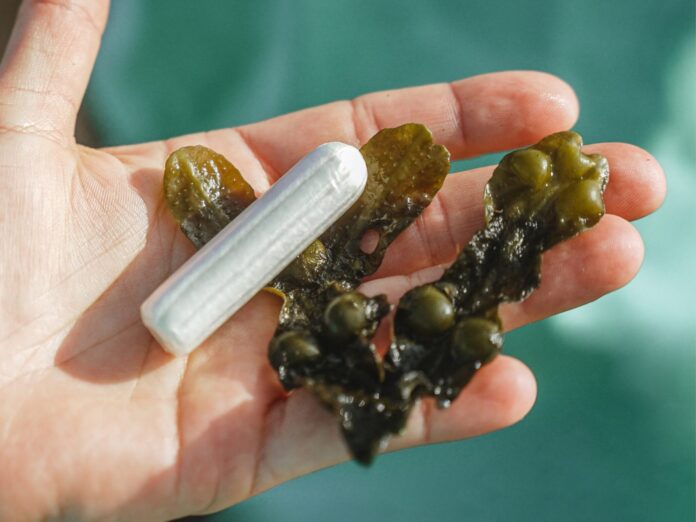4 Mins Read
Vyld, the female-founded Berlin startup making sustainable period products from algae, has secured a seven-figure sum in seed funding that includes a financing instrument they created themselves.
Three years after launch, Vyld has raised funding worth seven figures using a novel financing model, helping its mission to disrupt the feminine care industry. The company will use the investment to launch Kelpon, the world’s first tampon made from seaweed, and accelerate the development of its period diaper.
The investment is a combination of German government and EU funds, and angel and VC capital, leveraging a self-developed sustainable financing instrument, the Future Profit Partnership Agreement (FPPA). Created by co-founder Ines Schiller, the model blends the advantages of equity and debt capital, and aligns with Vyld’s vision of steward ownership and self-sustenance.
The startup will use the funds to launch to market what it claims is the world’s first tampon made from seaweed, while continuing to develop its incontinence pads. It’s part of a long-term vision of creating an Algaeverse of healthy, sustainable and circular products tapping seaweed’s potential to develop a regenerative economy and promote ocean conservation, which helps Vyld contribute to 12 of the 17 UN Sustainable Development Goals.
Built on a unique regenerative financing model
Crafted by Schiller, a former film producer, Vyld’s mezzanine financial instrument ensures the company remains independent, allowing profits to be reinvested, used to cover capital costs, or funnelled into philanthropic purposes – all the while enabling an appropriate return for investors. Instead of having an exit-based model like traditional VC startups, Vyld focuses on longer-term sustainability.
Steward ownership has two core principles. The first is self-governance, which means the voting rights of the company always remain with active employees, rather than external investors. The second is a profit-for-purpose approach, which means its profits can’t be privatised. So instead of being redistributed to shareholders, they’re reinvested in the company’s mission. It means that Vyld as a business owns itself.
Under the FPPA, the startup offers profit shares instead of a conventional equity round. Once the returns are achieved, the agreement ends. This means new investments can be secured outside of the typical equity round cycle, giving the company financial independence. This model appeals to investors who are interested in regenerative financing and are critics of maximalist financial principles.
“Tackling questions of ownership, power and financing is crucial to me as an entrepreneur. Business models create realities and extractive models do not only threaten the environment and health, but also reproduce exploitative standards and anti-democratic tendencies,” explained Schiller. “We want to counter this with a model that promotes creation instead of consumption, quality instead of quantity and triple top line instead of hypergrowth.”
Kai Viehof, one of Vyld’s investors, added: “Vyld shows that neither shareholder-value-driven venture capital nor unbridled growth is needed to successfully implement sustainable ideas that really make a difference for our planet and our society. However, change can only become possible on a broad scale if investors also rethink and provide the necessary capital fairly and with reasonable return expectations.”
As part of the company’s knowledge-sharing commitment, it is making this financial model available as an open-source case study to encourage other businesses to adopt a similar regenerative approach.
Vyld will release seaweed tampons this year, with diapers in development
Vyld was founded by Schiller and Melanie Schichan in 2021, with the long-term target of creating an entire ecosystem of non-food seaweed products under the Algaeverse, which entails both B2B and B2C offerings. The aim is to transform a menstrual health sector that produces high amounts of waste.
The startup claims that 90% of all period products employed are single-use, and plastic makes up a big chunk of their composition. Plastic comprises 90% of the content in disposable period pads, which is the equivalent of four plastic bags. It means these are not biodegradable and can take up to 600 years to decompose.
The seaweed Vyld uses in its menstrual products, though, biodegrades on land and in water, requires no fertilisers to grow, and doesn’t need to be bleached (unlike conventional tampons). Plus, it sequesters huge amounts of carbon and nitrogen while growing, offers anti-inflammatory benefits during use, and can also be applied across a range of materials, from tampon cores to external packaging.
The startup’s initial products are the Kelpon (a tampon) and Dyper (a diaper). The former was part of a successful trial with over 100 consumers late last year and is now being prepared for market launch. The latter is in pilot phase, part of a Windelwald (‘diaper forest’) project in partnership with German sanitary solutions company Goldeimer.
An algae-based compostable diaper without plastic or superabsorbent polymers, the Dyper is being trialled in 50 households both for everyday use and its potential as a humus fertiliser. The used diapers are composted under controlled conditions, and the fertilisers help plant a forest – hence the name ‘diaper forest’.
It’s an exercise in regeneration, marrying the ethos of the financial model with its product offering. It puts Vyld in pole position to disrupt a $30B market with sustainability and ethics at the heart of things.
The post Kelpon: German Female Founding Duo Raises 7-Figure Seed for World’s First Seaweed Tampon with Self-Created Financial Instrument appeared first on Green Queen.











